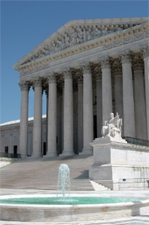Posts Tagged ‘supreme court’
Another “landmark” case for the Supreme Court
Today, the United States Supreme Court granted the petition filed by the state of Arizona to hear the case concerning the state’s immigration law passed in April, 2010. (See: page 2, case number 11-182 of the link). This was an appeal from the Ninth Circuit Court of Appeal’s decision finding many of the provisions of Arizona’s…
Read MoreSupreme Court agrees to hear Obamacare
This morning the United States Supreme Court granted the various Petitions for Writ of Certiorari filed by the parties in what has become known as the “Florida case”. In plain English, that means that the Court will hear oral arguments in each of the cases. You can find the link to the Order here at page 3.
Read MoreThe Supreme Court and Obamacare
The Supreme Court has what is known as private conferences. At these meetings the Justices decide what cases they will hear, and what cases they will not hear.
Read MoreThe first Monday in October
Today marks the beginning of the Supreme Court’s 2011-2012 term, and there are several interesting cases on the Court’s docket. Obviously many are focused on the issue of the constitutionality of Obamacare, but, there are other matters involving constitutional interpretation that should present some lively arguments.
Read MoreStates challenging Obamacare file before the Supreme Court UPDATE
Today, 26 states and the National Federation of Independent Business filed a Petition for Writ of Certiorari before the United States Supreme Court. A “petition for writ of cert” is simply a request by the parties that the Supreme Court hear the case. This is an appeal from the 11th Circuit Court of Appeals opinion, filed…
Read MoreMichigan, Ohio, and Obamacare
This is something that may be overlooked in Friday’s decision, by the United States Court of Appeals for the 11th Circuit, holding that the individual mandate of Obamacare is unconstitutional.
Read MoreSupreme Court dismisses class action case against Wal-Mart
On Monday the United States Supreme Court issued it’s decision in the case of Wal-Mart v. Dukes. If you are not familiar with the facts, let me give you a brief description.
Read MoreArizona employment law concerning illegal aliens is constitutional
Thursday, the United States Supreme Court issued its opinion in Chamber of Commerce v. Whiting. The Court held that an Arizona law that provides that the state can suspend or revoke the license of any employer who “knowingly or intentionally” employs an unauthorized alien is constitutional. The Court also upheld that portion of the Arizona…
Read MoreThe Supreme Court and climate change
On Tuesday, the United States Supreme Court will hear oral arguments in the case of American Electric Power v. Connecticut. It is too bad that the Court’s proceedings aren’t televised as the debate here should be lively. First, you need to know the background.
Read MoreIt is your money after all
Yesterday, the Supreme Court of the United States issued its opinion in the case of Arizona Christian School Tuition Organization v. Winn. The case hinges upon the issue of “standing”, which is a lawyer’s way of saying, do the people who have filed this law suit have the legal right to do so. But, the…
Read More


